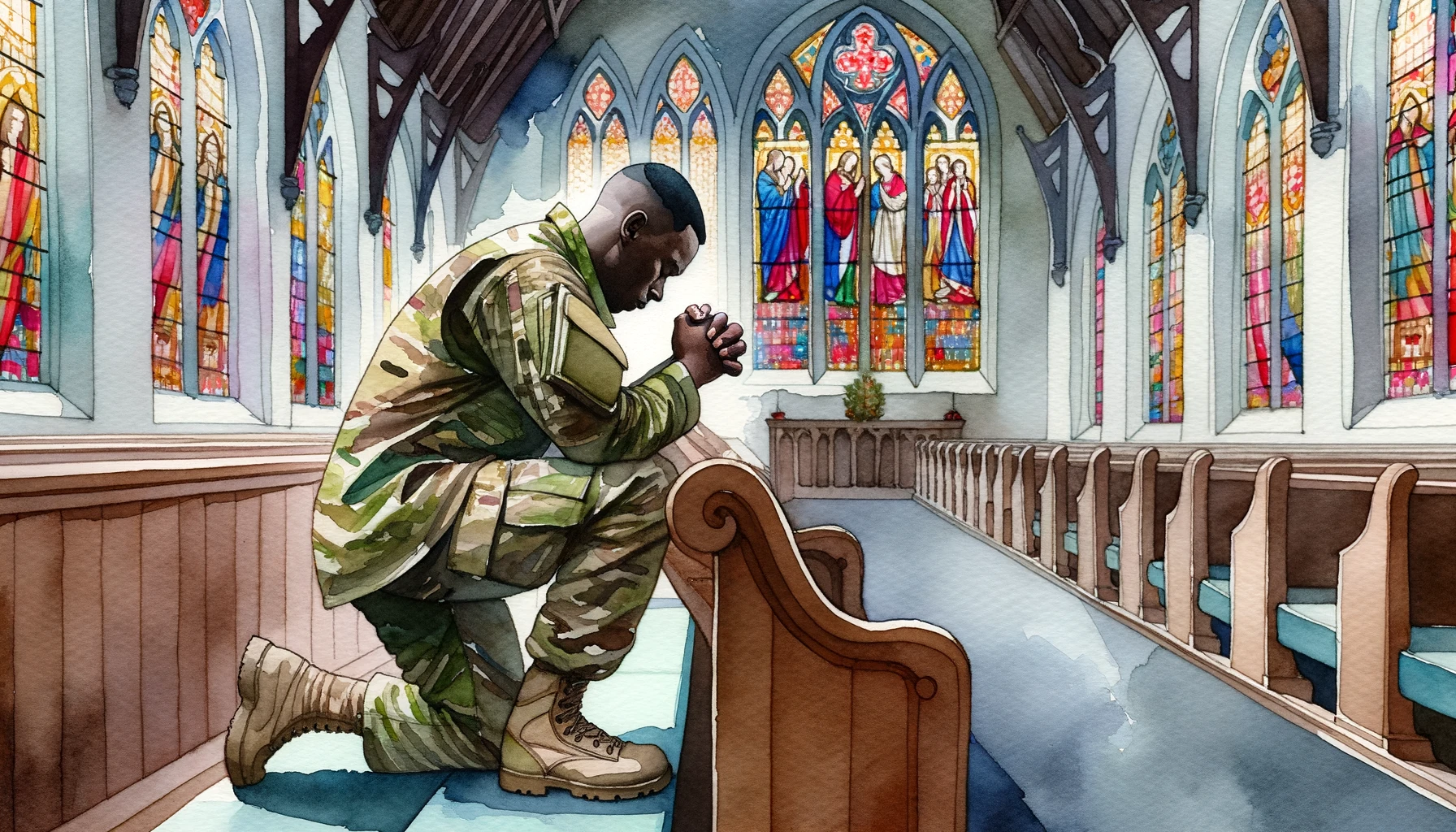The question of a Christian’s role in the military has sparked robust discussions and differing views within the faith community for centuries. As we explore this topic, our aim is not to dictate a singular path but to shed light on what the Bible says, understanding that personal conviction and guidance from the Holy Spirit are essential. We’ll examine key Biblical principles, historical context, and diverse Christian perspectives on serving in the military, highlighting the need for individual discernment and wisdom.
The Bible and Warfare: A Historical Context
The Bible encompasses numerous instances of war and military action, from Genesis to Revelation, reflecting the turbulent times in which many of these books were written. During the time of the Israelites, war was a commonplace occurrence and was often seen as a mechanism for establishing and protecting kingdoms (1 Samuel 14:47).
When we look at Old Testament figures such as David, we find someone who was both a warrior and a man after God’s own heart. David led his people in many battles and wars. In fact, he was such a skilled and fearless warrior that God even chose him to be king of Israel (2 Samuel 5:1-5). And yet, despite his military background, David is most remembered for his deep faith and love for God.
In the Old Testament, wars often carried divine sanction, particularly when Israel was under threat from hostile forces. A prime example of this is found in the Book of Joshua. Joshua led the Israelites into Canaan, their Promised Land, but this meant war with the resident nations (Joshua 1-12). In these circumstances, the warfare was presented as a directive from God, a necessary act to fulfil the promise made to Abraham.
In contrast, the New Testament provides a very different narrative. The life and teachings of Jesus Christ, often referred to as the Prince of Peace, present a paradigm of love, forgiveness, and peace. For example, in the Sermon on the Mount, Jesus taught his followers to love their enemies and pray for those who persecute them (Matthew 5:43-48).
This change in narrative does not imply a complete disavowal of the military. In the New Testament, soldiers appear several times, and Jesus interacts with them. One notable instance is the encounter between Jesus and a Roman centurion in Capernaum. Jesus commends the centurion’s faith and heals his servant without any admonition against his military service (Matthew 8:5-13).
The early Christian community lived within the confines of the Roman Empire, which was well-known for its military might. Followers of Christ existed within this militaristic society, and some of them were likely soldiers. The New Testament does not specifically condemn military service, but it does put significant emphasis on peace, love, and forgiveness. This seeming dichotomy leaves room for interpretation and underscores the complexity of our topic.
The Bible presents a multifaceted view of warfare. The Old Testament often portrays wars as divinely sanctioned, especially when Israel was under threat, while significant characters like David demonstrated both military prowess and deep faith. The New Testament strongly emphasises peace and love, as exemplified in the life and teachings of Jesus. It doesn’t explicitly condemn military service, suggesting a nuanced understanding of war and peace within Christian faith.
Key Biblical Principles Concerning War and Peace
Understanding the Biblical perspectives of war and peace involves navigating a series of principles spread across both the Old and New Testaments. Central to this discussion is the understanding that God is portrayed in the Bible as both a God of justice and a God of mercy.
Within the Old Testament, we find the Decalogue or Ten Commandments, one of which explicitly prohibits murder (Exodus 20:13). This injunction provides a clear principle of respect for life, yet it must be understood in the context of a society where warfare was prevalent, and where God, at times, seemingly endorsed it.
The Hebrew term used in the commandment, “ratsach”, specifically refers to an act of unlawful killing rather than killing in the context of warfare or the application of justice. This distinction indicates that while the taking of life is generally condemned, there was an understanding that in certain contexts, such as during war, it may occur.
Moving on to the New Testament, the emphasis shifts markedly towards principles of peace, reconciliation, and non-retaliation. Christ’s teachings echo this theme vividly. One instance is in the Sermon on the Mount, where Christ encourages turning the other cheek rather than retaliating when someone behaves unjustly (Matthew 5:38-42). Also, Jesus’ message of loving one’s enemies presents a profound challenge to the conventions of enmity and conflict (Matthew 5:43-48).
The Bible acknowledges the presence of authority, and in certain contexts, the necessity of it to maintain order. In his letter to the Romans, Paul asserts that governing authorities are established by God, implying that there is a divinely sanctioned role for these structures, which includes the military (Romans 13:1-7). This suggests that being part of such an authority, including military service, does not automatically conflict with Christian faith.
In the light of these principles, an interpretation emerges that Christian faith acknowledges the harsh realities of a fallen world, including conflict and war, yet it persistently advocates for peace, reconciliation, and love, even in the face of hostility. This dual recognition requires a careful balance in application, particularly for those Christians considering a role in the military.
The Bible provides key principles concerning war and peace. The Old Testament’s commandment against murder presents a respect for life, albeit within a context of frequent warfare. The New Testament, through Christ’s teachings, strongly emphasizes peace, reconciliation, and non-retaliation. Yet, it also acknowledges the role of governing authorities, including the military, as divinely sanctioned. This suggests a nuanced stance where Christian faith acknowledges the realities of conflict and war, but consistently advocates for peace and reconciliation.
Diverse Christian Perspectives on Military Service
Christian thought on military service has varied considerably throughout history, with different denominations and traditions interpreting the biblical texts in different ways. Two significant perspectives can be identified, and they represent different ends of a spectrum: the pacifist tradition and the just war tradition.
Pacifist tradition is rooted in the belief that all forms of violence, including war, are incompatible with Christian ethics. This viewpoint often cites Christ’s teachings on peace, non-retaliation, and love for enemies as foundational (Matthew 5:38-48). Pacifists contend that these teachings demand nonviolence in all circumstances, and thus military service is seen as incompatible with Christian discipleship. Some Christian denominations, such as the Anabaptists and Quakers, are well-known for their commitment to pacifism.
On the other end of the spectrum is the just war tradition. This viewpoint holds that war, while generally undesirable, can be morally acceptable under certain conditions. These conditions, referred to as ‘just war criteria,’ typically include principles like just cause, last resort, and proportionality. The just war tradition, originating from early Christian thinkers like Augustine and Aquinas, suggests that military service can be compatible with Christian ethics if it is in the pursuit of justice and peace (Romans 13:1-7).
In the middle of the spectrum are those who may not fully align with either pacifism or the just war tradition. These individuals often grapple with the tension between the biblical principles of peace and justice. They might, for instance, see military service as a valid career path for a Christian, provided it is approached with an earnest commitment to upholding peace and protecting the vulnerable.
Regardless of the position one adopts, each perspective shares a common, underlying commitment to following Christ. This includes seeking to embody Christ’s teachings in their lives, discerning how best to navigate a world characterized by both peace and conflict.
Within Christianity, perspectives on military service vary significantly. The pacifist tradition sees all forms of violence as incompatible with Christian ethics, while the just war tradition contends that war can be morally acceptable under certain conditions. In between are Christians who grapple with the tension between peace and justice, considering military service a valid path as long as it upholds peace and protects the vulnerable. Each perspective is an attempt to faithfully follow Christ in a world marked by both peace and conflict.
Faith at the Frontlines
The intersection of Christian faith and military service is complex and multifaceted. Rooted in the Biblical narratives and the teachings of Jesus, we find principles of peace, justice, respect for life, and recognition of divinely sanctioned authorities. These principles form the backdrop against which we grapple with the question of a Christian’s role in the military. In seeking to align our lives with the teachings of Christ, we are tasked with discerning how to live out our faith in a world marked by both peace and conflict.
To continue your reflection on this topic, consider these questions:
- How do I reconcile the Biblical teachings of peace with the reality of a world often marked by conflict?
- What role can Christians play in promoting peace, whether they serve in the military or not?
- How can the principles of justice and respect for life inform a Christian’s approach to military service?
Let us hold fast to our faith, seeking to embody the teachings of Christ in all areas of our lives. May we be guided by the Holy Spirit, discerning wisdom and understanding as we navigate the challenges and complexities of our world. Always, let us strive to be peacemakers, regardless of our career paths or life situations, reflecting the Kingdom of God in all we do.














